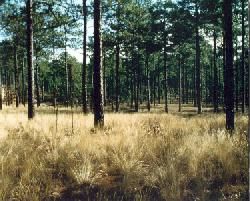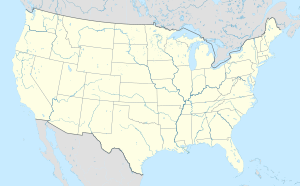Carolina Sandhills National Wildlife Refuge facts for kids
Quick facts for kids Carolina Sandhills National Wildlife Refuge |
|
|---|---|
|
IUCN Category IV (Habitat/Species Management Area)
|
|

Carolina Sandhills National Wildlife Refuge, May 2012
|
|
| Location | Chesterfield County, South Carolina, United States |
| Nearest city | McBee, South Carolina |
| Area | 45,348 acres (183.52 km2) |
| Established | 1939 |
| Governing body | U.S. Fish and Wildlife Service |
The Carolina Sandhills National Wildlife Refuge is a huge natural area in Chesterfield County, South Carolina. It covers about 45,348 acres (183.5 square kilometers). This special place is managed by the U.S. Fish and Wildlife Service. Their main office is in McBee, South Carolina. You can easily reach the refuge by U.S. Highway 1.
Contents
About the Sandhills Refuge
What are the Sandhills Made Of?
The Carolina Sandhills National Wildlife Refuge sits on very old sand. This sand was blown here by wind many thousands of years ago. This happened between 75,000 and 6,000 years ago. Today, plants and trees keep the sand from moving around.
Beneath these wind-blown sands are older layers of sand and mud. These older layers were formed by ancient rivers.
A Special Ecosystem
The Carolina Sandhills National Wildlife Refuge helps protect a unique natural area. This area is called the Carolina Sandhills. It has special features like inland sand dunes. The soil here is often very thin or even missing its top layer.
Wildfires happen often in this area. These fires are a natural part of the ecosystem.
Wildlife and Nature's Fires
Fires that are not too big or destructive are important here. They help remove plants that don't belong. This allows fire-loving plants, like the longleaf pine, to grow strong.
Many birds that like pine forests live here. Migratory birds also visit the refuge. Some important birds include the endangered red-cockaded woodpecker and the bald eagle. You might also spot wild turkeys.
Many mammals are also making a comeback in the Sandhills. These include the red fox and the eastern fox squirrel. You might also see beavers, white-tailed deer, and otters. Other animals like bobcats, opossums, raccoons, and cottontail rabbits live here too.
Managing the Refuge with Fire
The people who manage the Carolina Sandhills National Wildlife Refuge use a special tool. It is called prescribed burning. This means they carefully set small fires on purpose. These controlled fires help keep the ecosystem healthy. They also protect the plants and animals that depend on fire.
History of the Refuge
After people tried to farm this part of the Sandhills, they found it was very difficult. The soil was not good for growing crops. This was especially true during the Great Depression in the 1930s.
Because farming was not successful, the government decided to create something new. In 1939, this area became the Carolina Sandhills National Wildlife Refuge. It was created to protect the land and its wildlife.
 | Audre Lorde |
 | John Berry Meachum |
 | Ferdinand Lee Barnett |


